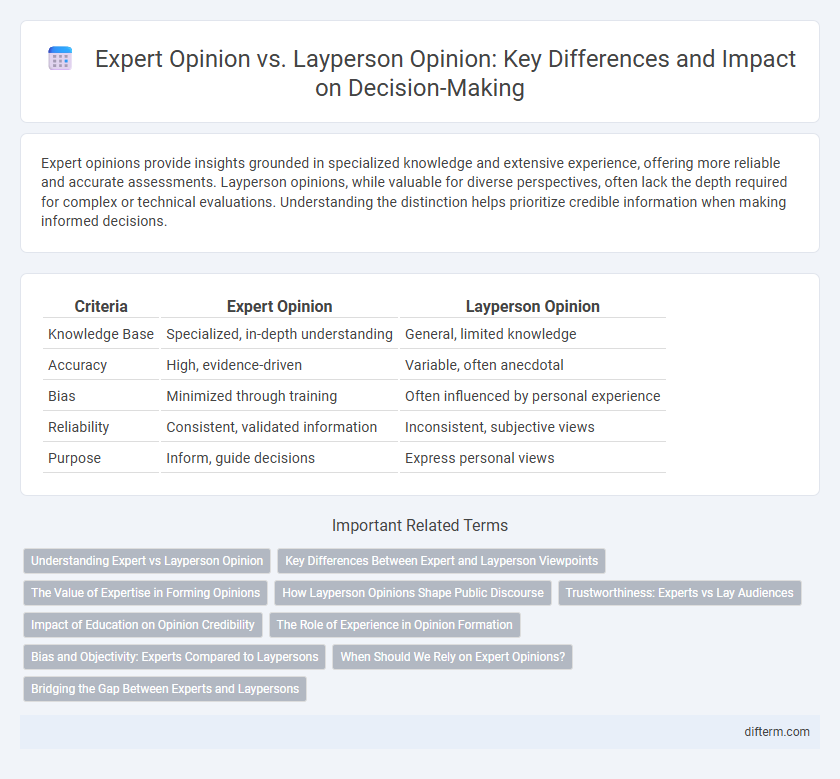Expert opinions provide insights grounded in specialized knowledge and extensive experience, offering more reliable and accurate assessments. Layperson opinions, while valuable for diverse perspectives, often lack the depth required for complex or technical evaluations. Understanding the distinction helps prioritize credible information when making informed decisions.
Table of Comparison
| Criteria | Expert Opinion | Layperson Opinion |
|---|---|---|
| Knowledge Base | Specialized, in-depth understanding | General, limited knowledge |
| Accuracy | High, evidence-driven | Variable, often anecdotal |
| Bias | Minimized through training | Often influenced by personal experience |
| Reliability | Consistent, validated information | Inconsistent, subjective views |
| Purpose | Inform, guide decisions | Express personal views |
Understanding Expert vs Layperson Opinion
Expert opinion is grounded in specialized knowledge, extensive training, and evidence-based analysis, often providing a reliable foundation for decision-making in complex areas. Layperson opinion, shaped by personal experience and common sense, can offer practical insights but may lack depth and consistency in technical contexts. Understanding the distinctions between expert and layperson opinions is crucial for evaluating the credibility and relevance of information in various fields.
Key Differences Between Expert and Layperson Viewpoints
Expert opinions are grounded in specialized knowledge, years of training, and empirical evidence, providing nuanced and reliable insights into complex subjects. Layperson opinions often reflect personal experiences, general understanding, and subjective impressions, leading to more accessible but potentially less accurate perspectives. The key differences hinge on depth of expertise, methodological rigor, and the ability to critically assess and interpret information within a specific domain.
The Value of Expertise in Forming Opinions
Expert opinion offers a critical foundation for informed decision-making by integrating extensive knowledge, specialized training, and empirical evidence, which layperson opinions often lack. The value of expertise lies in its ability to analyze complex information, anticipate consequences, and provide nuanced insights beyond surface-level understanding. Relying on expert judgment enhances the accuracy and credibility of opinions, particularly in fields like medicine, law, and science where precision is paramount.
How Layperson Opinions Shape Public Discourse
Layperson opinions significantly shape public discourse by reflecting diverse everyday experiences and values that resonate with broader audiences, often influencing social norms and policy debates. These opinions circulate widely through social media and grassroots movements, amplifying voices that may be overlooked by expert analysis. Although expert opinions provide specialized knowledge, layperson perspectives drive democratic engagement and create pressure for accountability and change.
Trustworthiness: Experts vs Lay Audiences
Expert opinions carry higher trustworthiness due to their reliance on specialized knowledge, formal training, and evidence-based analysis, which lay audiences often lack. Layperson opinions may reflect personal experiences and biases, limiting their reliability in complex or technical subjects. Trust in expert opinion grows when transparency, credentials, and peer validation are present, distinguishing experts from general audiences.
Impact of Education on Opinion Credibility
Expert opinions carry greater credibility due to their specialized education and extensive training, which equip them to analyze complex information accurately. Layperson opinions often lack the foundational knowledge required for in-depth understanding, making their perspectives more vulnerable to bias or misinformation. Educational background significantly enhances the reliability and trustworthiness of opinions in both academic and public discourse.
The Role of Experience in Opinion Formation
Expert opinion draws on extensive knowledge and years of practical experience, allowing for informed judgments based on evidence and specialized understanding. Layperson opinion often relies on personal observations and limited exposure, which can lead to subjective or incomplete conclusions. Experience enriches expert assessments by integrating nuanced insights that are typically absent in lay perspectives.
Bias and Objectivity: Experts Compared to Laypersons
Expert opinions often demonstrate higher objectivity due to their reliance on specialized knowledge, evidence, and systematic analysis, which reduces cognitive biases compared to layperson views. Laypersons are more susceptible to cognitive biases such as confirmation bias, availability heuristic, and emotional influence, leading to subjective and sometimes distorted perceptions. Studies show that expert evaluations consistently provide more accurate, reliable, and unbiased insights in complex fields like medicine, law, and science.
When Should We Rely on Expert Opinions?
Expert opinions should be relied upon when complex, specialized knowledge is required that surpasses general understanding, such as in medical, legal, or scientific contexts. Layperson opinions may offer valuable perspectives but often lack the depth and accuracy necessary for critical decision-making. Trusting expert consensus, supported by rigorous evidence and credentials, ensures more informed and reliable outcomes.
Bridging the Gap Between Experts and Laypersons
Bridging the gap between experts and laypersons enhances communication by translating complex technical jargon into accessible language, fostering better understanding across diverse audiences. Implementing interactive platforms and educational programs enables laypersons to engage with expert knowledge, promoting informed decision-making and trust in specialized fields. Emphasizing empathy and active listening in expert-layperson dialogues cultivates mutual respect, reducing misconceptions and empowering collaborative problem-solving.
Expert opinion vs Layperson opinion Infographic

 difterm.com
difterm.com